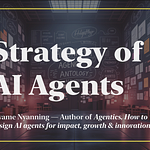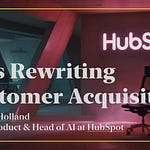GenAI’s promise is that digital experiences will become more intelligent. Big Medium Founder Josh Clark and his daughter, Veronika Kindred, are the authors of the upcoming book “Sentient Design” and the latest guests on the podcast. They see products that are radically adaptive to our situational needs and collaborate with users in ways that seemed insane a few years ago.
Listen on Spotify | Listen on Apple Podcasts
But what struck me the most were three things:
Veronika, a GenZer who figuratively grew up inside of tech because of her father’s work, sees the role of AI much differently than what us older folk would expect. There’s an awkward comfort with the centralization of power within these systems and the expectation that we, the users, will decide whether it is used for good or bad.
Not building towards personalization. Josh knows that it requires far too much data for a system to understand us and what we truly need. So they’re better suited to inferring where we are in our journey, making assumptions about what might have changed about us, and adapting to meet us where we are.
Josh is a champion for embracing the weirdness of AI. Rather than be intimidated and worried about hallucinations, use the not-so-perfect technology in ways that provide unexpected results.
The counter-point to intelligent products continues to be how much intelligence a user wants and how much personal information they are willing to give up for it. There’s nothing more uncomfortable than a salesperson who doesn’t get your signals.
Adobe’s Project Concept is the start of something huge
Embracing the weirdness is exactly what Adobe’s new product, Project Concept does. Better you watch the video than me try and explain. It will be interesting to see how agencies respond to the further commoditization of their expertise.
Always remember, GenAI is great at the boring stuff
Amazon, in its quest for greater efficiency, has developed new systems to shave seconds off each package delivery and to help customers make faster buying choices, even for new product types that they may know little about. The company announced Wednesday it has created spotlights within its trucks to guide delivery people to packages for each stop along a route.
"When we speed up deliveries, customers shop more," said Doug Herrington, CEO of Amazon worldwide stores in remarks at the event. "Once a customer experiences fast delivery, they will come back sooner and shop more."
Interestingly, this also highlights the tech’s ability to imagine solutions to problems that humans may not be able to see otherwise. You could call that embracing the weirdness again.
We’ll go into this conversation in detail when we interview Lisa Weaver-Lambert, the author of The AI Value Playbook. In the book she interviewed business leaders to document exactly where and how AI has been delivering value.
Multi-modal AI: 8 ways computer vision will change our lives
While GenAI has been monopolizing the headlines, Apple, Meta, and Snap continue to invest in augmented reality headsets. Apple's Vision Pro landed with a thud —largely due to the price and home-bound use cases— but the others stirred buzz because they focused on lightweight and fashionable eyewear (courtesy of their partnership with Ray-Ban).
We've been here before though. Google Glass famously failed. And no one remembers Snap's previous eyewear.
But now is different.
AI researchers have made huge advancements related to computer vision. If AI enables computers to think, computer vision enables them to see, observe and understand.
Continue reading the article on LinkedIn…
jmlg1PjBPcyf8mwPJYsf
Want to join as a contributor?
Contact us info@designof.ai to help us collect the best resources about how AI is shaping the world around us.










